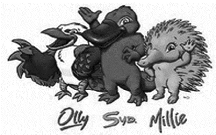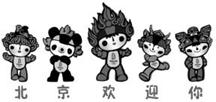
题目列表(包括答案和解析)
Living in the foreign culture can be exciting, but it can also be confusing. A group of Americans who taught English in other countries recently discussed their experiences . They discussed that miscommunications were always possible, even over something as simple as “yes” and “no”.
On her first day in Micronesia, an island in the Pacific, Lisa thought the waitress wasn’t paying any attention to her. The day was hot she went into a store and asked, “ Do you have any cold drinks ?” The woman there didn’t say anything. Lisa repeated the question again. Still the woman said nothing. She later learned that the woman had answered her: She has raised her eyebrows , which in Micronesia , it means, “yes”.
Jan remembered an experience she had in Bulgaria, a country in Europe. She went to a restaurant that was known for its cabbage. She asked the writer, “Do you have cabbage today ?” He nodded his head. Jan waited, but the cabbage never came. In that country, a nod means “no”.
Tom had a similar problem when he arrived in India. After explaining something in class , he asked his students if they understood . They answered with different nods and shakes of heads. He thought some people hadn’t understood, so he explained again. When he asked again, the did the same thing. He soon found out that his students did understand. In India, people nod and shake heads in different ways . It depends on where they come from.
1.These Americans teaching English in other countries found that they _____________.
A. needed to learn foreign languages.
B. should often discuss their experiences
C. had problems with communications
2.People in Micronesia show “yes” by _________.
A. nodding heads B. raising the eyebrows C. shaking hands.
3. Tom misunderstood his class at first because __________.
A. he didn’t know much about Indian culture
B. he didn’t explain everything clearly enough
C. he didn’t know where the students came from
4.Which of the following is TRUE according to the passage?
A. In Bulgaria, nodding heads means “no”
B. Jan taught English on a Pacific island
C. Lisa was trying to buy some cabbage.
5.The passage is mainly about _________.
A. body language in foreign restaurants
B. class discussion in Indian schools
C. miscommunicaions in different cultures
Paris, the capital of France, is one of the _________ cities in Europe.
| A.liveliest | B.more peaceful | C.much fascinating | D.thrilling |
Mascots for the Olympic Games
 |  |  | | |
| 20th | 23rd | 26th | | |
| 1972 | 1984 | 1996 | | |
| Munich (慕尼黑) | Los Angeles | Atlanta | | |
| Germany | America | America | | |
| Europe | North America | North America | | |
 |  | |||
| 27th | 29th | |||
| 2000 | 2008 | |||
| Sydney | Beijing | |||
| Australia | China | |||
| Oceania | Asia | |||
| A.3 | B.4 | C.5 | D.6 |
| A.Sydney | B.Los Angeles | C.Atlanta | D.Munich |
| A.North America | B.Europe | C.Oceania | D.Asia |
| A.town | B.city | C.country | D.province |
| A.The 1996 Olympic Games was held in America. |
| B.The 27th Olympic Games was held in Europe. |
| C.The 29th Olympic Games was held in China. |
| D.The mascot for Beijing 2008 Olympic Games is not only one. |
Have you heard of the term “etiquette” And do you know that etiquette is not only a useful word 46 very useful to understand?
Etiquette is not the same in every culture 47 in every situation. For example, standing very close to the person you are talking with is quite common in some Asian countries. However; if you do this in Europe, some 48 people might feel 49.Even in China, we all know that etiquette is not the same in all situations. Perhaps we think that talking loudly in our own homes is fine, but there are other places where talking loudly is 50 .For example ,most people would agree that talking loudly in a library, a museum, or a movie theater is 51 .Even if you are with your friends, it is better to keep your voice 52 in public places. In fact, we should also 53 not to cough or sneeze loudly in public.
If we see someone 54 the rules of etiquette, we may politely give them some suggestions. Perhaps one of the most polite ways 55 ask someone, Would you mind doing this or Would you mindnot doing that. For example, if someone cuts 56 you in a line, you could ask them, Sorry, would you mind 57 the line? If someone is smoking on the bus you could ask, Excuse me, could you please 58 that cigarette? People don’t usually like 59 , so we have to be careful how we do this.
Although rules of etiquette can often be different, some rules are the same almost everywhere in the world! For example, 60 is almost never allowed. If you see someone you know doing this, you can ask them, Would you mind picking it up?
|
1. |
|
|
2. |
|
|
3. |
|
|
4. |
|
|
5. |
|
|
6. |
|
|
7. |
|
|
8. |
|
|
9. |
|
|
10. |
|
|
11. |
|
|
12. |
|
|
13. |
|
|
14. |
|
|
15. |
|
Living in a foreign culture can be exciting, but it can also be confusing (令人迷惑的). A group of Americans who taught English in other countries recently discussed their experiences. They decided that miscommunications were always possible, even over something as simple as "yes" and "no".

On her first day in Micronesia, an island in the Pacific, Lisa thought people weren’t paying any attention to her. The day was hot. She went into a store and asked, “Do you have cold drinks. The woman there didn't say anything. Lisa repeated the question. Still the Woman said nothing. She later learned that the woman had answered her: She had raised her eyebrows (眉毛), which in Micronesia means "yes".
Jan remembered an experience she had in Bulgaria, a country in Europe. She went to a restaurant that was known for its cabbage. She asked the waiter, "Do, you have cabbage today?" He nodded his head. Jan waited, but the cabbage never came. In that country, a nod means no.
Tom had a similar problem when he arrived in India. After explaining something in class, he asked his students if they understood. They answered with many different nods and shakes of the head. He thought some people had not understood, so he explained again. When he asked again, they did the same thing~ He soon found out that his students did understand. In India, people nod and shake their heads in different ways depending on where they come from. You have to know where a person is from to understand whether they mean "yes" or "no".
1.These Americans teaching English in other countries found that they ______.
A. should go abroad for vacations
B. needed to learn foreign languages
C. should often discuss their experiences
D. had problems with communications
2.People in Micronesia show "yes" by ____.
A. nodding heads B. raising eyebrows
C. shaking heads D. saying "no"
3.Tom misunderstood his class at first because
A. he did not know much about Indian culture
B. he didn't explain everything clearly enough
C. some students didn't understand his questions
D. he didn't know where the students came from
4.Which of the following is TRUE according to(根据) this passage?
A. In Bulgaria, nodding heads means no.
B. Jan taught English on a Pacific island.
C. Lisa was trying to buy some cabbage.
D. In India, only shaking heads means "YES".
5.The passage is mainly about _____.
A. body language in foreign restaurants
B. class discussion in Indian schools
C. miscommunication in different cultures
D. English teaching in other countries
湖北省互联网违法和不良信息举报平台 | 网上有害信息举报专区 | 电信诈骗举报专区 | 涉历史虚无主义有害信息举报专区 | 涉企侵权举报专区
违法和不良信息举报电话:027-86699610 举报邮箱:58377363@163.com